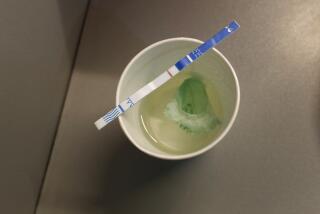County Health Officials, Gays at Odds Over AIDS Test Use
- Share via
Orange County public health officials are at odds with members of the gay community over the usefulness of a blood test licensed Saturday to detect evidence of the virus believed responsible for Acquired Immune Deficiency Syndrome (AIDS).
Although the new test shows only that a person has been exposed to the virus, Orange County public health officials believe it can be a valuable tool in tracking the spread of the disease. They are advocating extensive testing of sexually active gay or bisexual men at the county’s Special Diseases Clinic in Santa Ana as soon as test kits are available.
Representatives of the AIDS Response Program in Garden Grove, however, say they refuse to endorse widespread testing of gays because the test, which they refer to as a “Pandora’s box,” is unreliable.
The test, which detects antigens to the Human T-Cell Leukemia Virus III (HTLV-III), is intended mainly to screen blood supplies to eliminate the risk of spreading the disease through transfusions. Of nearly 8,600 cases of AIDS diagnosed in the United States, 1.2% have been attributed to transfusion of contaminated blood or blood products.
Gay leaders argue that the test produces significant numbers of false reactions, and they fear that unreliable test results will not be kept confidential and could be obtained and misinterpreted by employers, insurance companies or homophobic groups.
Also, they point out, an infected person may not have developed antibodies to the virus at the time of testing.
“One big fear is that (gay) persons who test negatively, but actually have the virus, may take it as an all-clear sign to go back to unsafe sexual practices,” said Randy Pesquiera, director of the AIDS Response Program, a state-funded educational outreach project operated by the Gay and Lesbian Community Services Center of Orange County.
“Besides, if a person does have a positive test, we have no way to tell them if they have had the disease and are over it, if they are carriers or if they are incubating the disease and will come down with it,” said Dr. Sherman Williamson, a member of the county’s AIDS Task Force and immediate past president of Southern California Physicians for Human Rights.
“I don’t think it’s fair to put the burden on a individual and let them think they are going to come down with the disease,” Williamson said.
Concerns Expressed
These same inaccuracies, meanwhile, have American Red Cross officials fearful that gay men and other high-risk donors will flock to donation centers just to be tested. They also are worried about what to tell low-risk donors when they test positive for the virus.
“We’re working on that,” said Dr. Benjamin Spindler, medical director of blood services for the American Red Cross in Orange County.
Since it first appeared in the United States in 1979, AIDS has been limited almost exclusively to sexually active gay or bisexual men, Haitians, intravenous drug users, hemophiliacs and others exposed to contaminated blood products.
As of Feb. 25, the mysterious and deadly disease that destroys the body’s immune system had killed 4,145 of the 8,597 people diagnosed with AIDS in the United States since reporting began in 1981, according to the federal Centers for Disease Control in Atlanta.
In California, 791 of 1,950 people diagnosed with AIDS have died, CDC public affairs officer Charles Fallis said. All but nine of the California cases have been adults.
In Orange County as of Feb. 28, 49 of 92 people diagnosed with AIDS have died, county health officials said.
Of those who died, all were gay or bisexual men except four. One of those four was a woman who had been an intravenous drug user and two were transfusion-related cases. The fourth was the first reported Orange County AIDS death involving a child, an 18-month-old girl who died last December. Health officials have not determined how she contracted AIDS.
The AIDS virus is believed to attack and grow in the same infection-fighting white blood cells that are defective or missing in AIDS patients.
Severe Symptoms
The most severe symptoms of the disease include a rare skin cancer, Kaposi’s sarcoma, and a parasitic lung infection called Pneumocystis carinii.
The virus is believed to be spread through the exchange of blood and body fluids, primarily through intimate physical contact.
But with an increasing number of transfusion-related cases--104 such cases and 61 hemophiliac cases as of the CDC’s Feb. 25 report--there has been a rush to develop a screening test for the viral agent to protect the nation’s blood supplies.
At a news conference Saturday in Washington, D.C., Health and Human Services Secretary Margaret M. Heckler and Frank E. Young, commissioner of the Food and Drug Administration, announced that Abbott Laboratories of North Chicago, Ill., had been licensed to market the AIDS test.
Four other companies also have applied for FDA approval to produce the test. Heckler said two more producers may be licensed later this week.
For months, how to handle the long-awaited test has been a critical and consuming issue for Orange County’s 1 1/2-year-old AIDS Task Force, composed of public health officials, including the Red Cross’ Spindler, physician Williamson and Pesquiera.
Among low-risk groups, health authorities say the test is expected to be 99% effective in flagging antigens to HTLV-III. But among high-risk groups, including gay or bisexual men, Haitians, hemophiliacs and users of injectable drugs, research suggests that it may be only 80% to 90% effective, county epidemiologist Dr. Thomas Prendergast said.
Testing Discouraged
For that reason, health and blood bank officials and gay community leaders across the country and in Orange County have launched an intense effort to discourage high-risk individuals from going to donor centers to be tested.
Federal officials have promised to pay for tests done away from blood donation centers, and legislation also is pending in Sacramento to finance free testing at county clinics and to protect the privacy of those tested. However, officials with the county Health Care Agency do not plan to wait for a decision.
“We intend to use it as quickly as it’s released and available to us,” said Prendergast, deputy assistant director for epidemiology and disease control at the county Health Care Agency.
So does the Red Cross, which provides at least 50% of the nation’s blood supplies and more than 80% in California.
The test kits were being sent Saturday afternoon to Los Angeles, San Francisco and Chicago, and some blood banks were expected to have them in hand by nightfall. Red Cross officials in Washington, D.C., said kits were expected to be in all Red Cross blood banks within a few days.
Gay community leaders say the Red Cross’ fear of gays stampeding blood donor centers to be tested is unlikely to occur in Orange County.
“Here, the gay population tends to be more removed from the problem (of AIDS),” Williamson said. “We really don’t have a gay concentration of people as you do in San Francisco and Los Angeles.”
‘Wouldn’t Want to Know’
“The majority of men I’ve talked to have said they wouldn’t want to take (the test) because they wouldn’t want to know,” Pesquiera said. “I mean, if it doesn’t tell you anything, who needs the stress? If you turn up positive, they tell you to live your life as though you have AIDS.
“I wouldn’t want to open that Pandora’s box of questions for myself.”
Those who do want the test can go to the county clinic at 1725 West 17th St., Santa Ana. Prendergast said his staff has been thoroughly prepared to administer the tests, including special CDC training for the county’s laboratory director and virologist.
Those who test positive, whether at blood donor centers or at county clinics, are expected to be added to a national list of deferred donors, people who have tested positive for hepatitis and other diseases that can be transmitted through blood. Health officials say the list of names will not include the specific reason for deferral.
Despite the possibility for error, Prendergast said he believes the tests can be very beneficial for the overall good of public health.
“It will help us to diagnose the condition in individuals, and if there are any other modes of spreading the disease we don’t know about, we will ultimately learn of them through this test,” Prendergast said.
More to Read
Sign up for Essential California
The most important California stories and recommendations in your inbox every morning.
You may occasionally receive promotional content from the Los Angeles Times.













